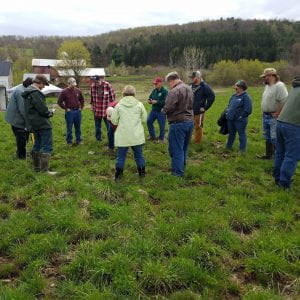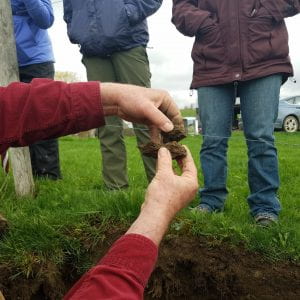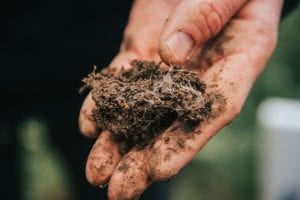Compaction can be a serious issue on farms resulting in soil erosion and declining productivity. Because compaction worsens over time, it is often present without the farmer’s knowledge, and therefore not managed. It is unique because the level of compaction changes with the moisture of the soil, and therefore compaction measurements cannot be compared from one day to the next. This makes it difficult to know if efforts to improve compaction are successful.
Compaction can occur in all land on the farm, but the Northeast SARE Project Identification and Remediation of Compaction on Northeast Pasture Soils has a unique proposal to measure compaction on pasture soils to know just how severe the problem is.
Fay Benson was granted a 3-year Northeast Sustainable Agriculture Research and Education Grant in early 2019 to study the compaction on grazing farms in the Northeast, with various tools including the NY Soil Health Trailer and penetrometers. By enlisting the help of 30 other grazing educators in New York, Pennsylvania, Vermont, New Hampshire and Maine, we will take compaction measurements under a permanent fence line and from the corresponding pasture on 4 different dates in order to develop a Pasture Compaction Ratio. The fence line and the pasture measurement will be compared to each other from each visit to create a ratio, and the ratio will be compared to other ratios over time to look for changes.

This Spring, Fay Benson and Abbie Teeter put on two trainings for grazing educators in the Northeast. The trainings began with a presentation from Fay Benson, Project Lead. Fay introduced the project team and the other trainers, and offered an overview of the grant activities. Additionally, Fay gave a review of the topic of pasture soil compaction.
Next, Larry Hepner, Emeritus Professor of Agronomy & Environmental Science, Delaware Valley University, presented “Identifying Soil Structure Changes when Compacted” and went over handouts trainees could use in the field. Bob Schindelbeck, Cornell Soil Health Lab Director, finished the morning presentations with “Plant/Soil Interaction and how it is Affected by Soil Compaction.” After lunch, in the pouring rain, the 25 educators traveled to a nearby grazing dairy farm for demonstrations of the Soil Health Trailer, a soil pit, using an Infiltrometer Ring, and collecting data for the Pasture Compaction Ratio.

After completing this training, the educators will plan a pasture walk or on farm event in their area with the Soil Health Trailer. At the event, the participants will use penetrometers to take readings for the Pasture Compaction Ratio. In addition, the educator will make three separate trips to the farm to take additional readings, so ratios can be compared to each other. There will also be more in-depth data collected by members of the project team throughout the 3-year project.

